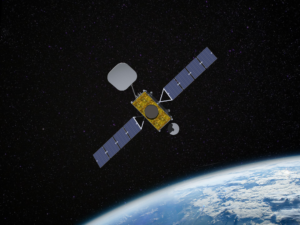The satellite operator has announced its new Inmarsat-8 small satellites will launch in 2026 to provide crucial safety services and support advances in emergency tracking.
19 May 2023 – Inmarsat, a world leader in global, mobile satellite communications, has announced that SWISSto12, one of Europe’s fastest growing aerospace providers, will develop its new eighth-generation of spacecraft. The three I-8 satellites will provide additional network resilience, securing the future of Inmarsat’s global L-band safety services.

SWISSto12, headquartered in Switzerland, will use its HummingSat satellite platform – in conjunction with unique 3D-printing technologies and specialised Radio-Frequency (RF) and payload products – to develop and manufacture the geostationary satellites, which will launch by 2026.
Just 1.5 cubic metres in volume, the I-8’s will use SWISSto12’s innovative new class of spacecraft which has a form factor up to five times smaller than conventional geostationary satellites yet can still deliver critical safety services with certainty.
The three l-8 satellites will continue to provide the extra layer of resilience to complement the existing constellation and Inmarsat’s two I-6 generation satellites, which were launched in December 2021 and February 2023. In March 2023, Inmarsat announced the first, I-6 F1, had successfully completed testing with ground stations in Western Australia and has now started to provide Ka-band services for the fast-growing Asia Pacific region. The company will begin introducing its L-band capacity and transitioning services to the new satellite throughout 2023.
The second, I-6 F2, which launched in February 2023, is expected to enter operational service over Europe, Africa, and much of the Americas in early 2024.
Each I-8 will also extend Inmarsat’s history of launching and operating radionavigation transponders for Governments and international space agencies. These transponders can enable Satellite-Based Augmentation System (SBAS) services around the world, for example for air traffic controllers or coastguards. SBAS systems use satellite connectivity, land-based infrastructure, and software to enhance standard GPS/Galileo accuracy of 5 to 10 metres to as little as just 10cm.
Such precise tracking could enable pinpoint safety navigation on aircraft, help emergency services reach vessels in distress more quickly, or allow a raft of industrial innovations, like device tracking in agriculture or advanced, automated transport management systems.
The I-8 satellites will continue to secure Inmarsat’s global safety services into the 2040’s. The company was founded in 1979 under the auspices of the United Nations specifically to provide highly reliable safety communications. Today some 1.6 million seafarers and over 200 airlines rely on Inmarsat’s global L-band network to deliver 99.9% availability every day.
The Inmarsat-8 programme forms part of Inmarsat’s fully funded technology roadmap, which will include five new satellite payloads added by 2025 to further Inmarsat’s high-speed broadband Global Xpress (GX) network with the launch of the software defined satellites GX 7,8, and 9, aimed for 2025, and the polar coverage satellites GX10a and b, which are aimed for the first half of 2024.
Peter Hadinger, Chief Technology Officer, Inmarsat, said: “Every single day people around the world depend on Inmarsat services. Our customers have demanding, and often safety critical, missions that rely on our satellite technology for links that can make the difference. The I-8’s will not only underpin our existing capabilities for the future; but enable ever more advanced safety innovations like SBAS that can ultimately help save more lives. We have chosen SWISSto12 because they have the ground-breaking technology that can make it a reality.”
Emile de Rijk, CEO, SWISSto12, said: “We are delighted that Inmarsat has selected SWISSto12 as its partner for its landmark l-8 program. It demonstrates that, with HummingSat, we have created a highly advanced new class of small geostationary spacecraft that delivers world-leading connectivity capabilities at a fraction of the cost. Our proprietary 3D-printing of Radio Frequency payload technology allows us to push the limits of existing capability and service new and existing business cases for geostationary satellite communications. This is an important step in our journey to better connect and protect every corner of the world.”
ABOUT INMARSAT
Inmarsat delivers world leading, innovative, advanced and exceptionally reliable global, mobile communications across the world – in the air, at sea and on land – that are enabling a new generation of commercial, government and mission-critical services. Inmarsat is powering the digitalisation of the maritime industry, making operations more efficient and safer than ever before. It is driving a new era of inflight passenger services for aviation, while ensuring that aircraft can fly with maximum efficiency and safety. Furthermore, Inmarsat is enabling the rapid expansion of the Internet of Things (IoT) and enabling the next wave of world-changing technologies that will underpin the connected society and help build a sustainable future. And now Inmarsat is developing the first-of-its-kind, multi-dimensional communications network of the future, ORCHESTRA.
In November 2021, Inmarsat and Viasat announced the planned combination of the two companies, to create a new leader in global communications.
For further information, follow us: Twitter | LinkedIn | Facebook | YouTube | Instagram.
ABOUT SWISSto12
SWISSto12 is a leading manufacturer of advanced satellite payloads and systems, including the HummingSat: a small yet powerful geostationary telecommunications satellite developed in collaboration with the European Space Agency (ESA) through its public-private-partnership program. The first commercial customer of HummingSat was announced in November 2022. The company’s satellites and payloads benefit from unique and patented 3D-printing technologies and associated Radio Frequency (RF) product designs that deliver lightweight, compact, highly performing, and competitive RF functionality. Besides its space portfolio, the company is also active in telecommunications, surveillance and radar applications for the aeronautic industry. SWISSto12 has developed commercially with success in Europe, the USA and Israel and is amongst the fastest growing aerospace companies in Europe. SWISSto12 spun off in 2011 from the Swiss Federal Institute of Technology in Lausanne (EPFL), is privately owned and backed by prominent Swiss and European Investors.
For further information, visit https://swissto12.com
